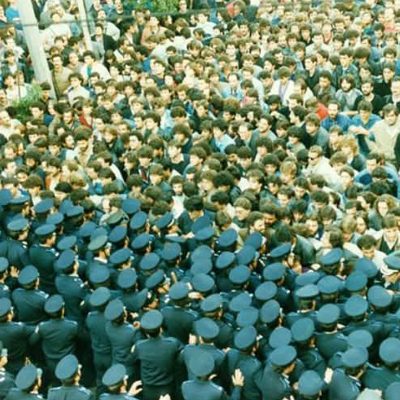“The Uprising of the Large Intestine” – POLYTECHNIC 1987
The episode opens with a song performed by Elena Nathanael from the album “To Χρονικό των 3 ημερών (Chronicle of the Three Days), with music by Anacreon Papageorgiou and lyrics by Kostoula Mitropoulou. It is the only time Elena Nathanael ever recorded a musical performance, and the album was never officially released. The song name, “Kostantis,” refers to the first victim of the Polytechnic uprising — Diomidis Komninos, aged 17.
On 13 November 1987, for the first time since the restoration of democracy, 20,000 students clashed with the riot police of Andreas Papandreou’s government, in the midst of PASOK’s era of promised “Change.” The episode’s title draws on a phrase used at the time by the Minister of Education and Religious Affairs, Antonis Tritsis.
Two years earlier, in 1985, Greece had come under pressure from the IMF, leading to an agreement in 1989, while rumours about the introduction of private universities had already begun circulating. One of the triggers for the “Autumn of Anger” was an internal regulation at NTUA providing for the expulsion of students. During that period, students occupied the “Rivoli” porn cinema, which belonged to the University. Theodosis Tassios, associated with the Masonic Lodge of Piraeus, publicly opposed the students’ actions. The Opposition dismissed them. Kotzias and parties such as the Communist Party of Greece were in discussions with industrialists, promoting a “scientific-technical trajectory” aligned with the priorities of the then EEC. Theodoros Pangalos advocated a dual-track degree system (COMET) — one Greek and one aligned with European standards. Even industrialists weighed in on the value of degrees awarded by Greek universities. [Source: article by Tasos Kostopoulos].
The program ends with developments from 2017 to the present, examining the state of the university community and contemporary student perspectives.
Produced and presented by Nikol Liakostavrou
